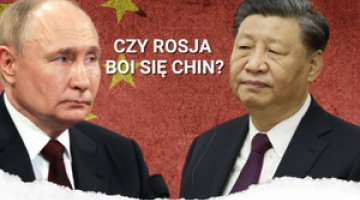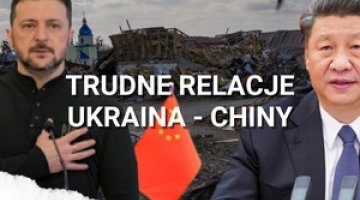Increased tension around Taiwan
Political tensions around Taiwan are increasing days before the presidential election in the US. On 26 October the US and Japan began the ten-day Keen Sword exercise in the region of Okinawa, to the northeast of Taiwan. 46,000 soldiers and marines are taking part in the exercise and four strategic B-1B Lancer bombers, capable of carrying nuclear weapons, have been relocated to Guam. Previously, the US, for the first time in decades, offered Taiwan weapon systems able to hit targets in China or to pose a threat to the invasive fleet. In October alone the US administration notified Congress of the agreement to supply two large packages of weapons to the island. This was the response to China’s continual toughening of the policy towards Taiwan and, in the short term, to speculations spread by both the Chinese and US media that communist China may use a potential post-election political and constitutional crisis in the US in order to attack Taiwan. In a speech to soldiers in the southern province of Guangdong at the beginning of October this year the Secretary General of the Chinese Communist Party and the Chairman of the People’s Republic of China Xi Jinping stated that they should ‘focus their attention and energy on preparation to war’. The activity of Chinese paramilitary operations on the waters around Taiwan has also intensified and the government controlled media has reported about this exercise which has all characteristics of preparations for an invasion.
Commentary
- The prime example of the tangible toughening of the rhetoric against Taiwan on the part of China’s leaders was their abandonment in 2020 of the adjective ‘peaceful’ when talking about the unification of the island with the continent. This indicates that China has gained a certain military advantage over Taiwan but above all, it also points to the progressing disintegration of relations between China and the US. Economic and political pressure is being exerted on the countries which maintain diplomatic relations with Taiwan in order for them to shift their recognition to China. China has also announced that it does not recognise the so-called ‘median line’, that is the border between the airspace of China and that of Taiwan in the Taiwan Strait, which was a result of a tacit agreement. The re-election of President Tsai Ing-wen, who is seen as being sympathetic with the independence movement, in the January election, confirmed the conviction held by the Chinese Communist Party that Taiwanese society is not interested in the Chinese social and political model. The Communist Party is hostage to the nationalist narrative which legitimises authoritarian rule. Therefore, in the face of serious economic challenges, the annexation of Taiwan would politically strengthen the Chinese regime and would give the Chinese Navy direct access to the western Pacific. At the same time China is aware that its relations with the US will not fundamentally improve regardless of the result of the presidential election, and the reform of the Taiwanese army and supplies of modern types of weapons will neutralise China’s relative military advantage.
- China’s increasing authoritarianism, the pacification of the protest movements seeking to maintain Hong Kong’s autonomy in 2019–2020 and as a result the discreditation of the ‘one country, two systems’ principle as a credible unification formula have led to Taiwan’s growing determination to defend its de facto sovereignty. Since the re-election of President Tsai Ing-wen in January 2020 and the renewed mandate of the ruling Democratic Progressive Party, the activities aimed at increasing Taiwan’s defence capabilities have been enhanced. They enjoy wide support in Taiwanese society, even though they entail the possible reinstatement of compulsory military service and a significant rise in military spending. These measures are being accompanied by intensified informal relations with the US, such as the talks on concluding a free trade agreement and implementing joint infrastructure initiatives in the Asia-Pacific region. The Kuomintang (KMT), the main opposition party in Taiwan has long been in favour of closer economic ties with China and has accepted the prospect of the unification in the undefined future. However, it is also reviewing its political agenda and seeking opportunities to establish dialogue with the US establishment. This is dictated not only by social and cultural changes in Taiwan but also by the fact that the KMT elite has realised that there would be no space for its political activity in Chinese state unified by the Communist Party.
- Even though the US does not formally guarantee Taiwan’s security, it has expressed its disagreement with a possible military annexation of the island by China and it has defined itself as the patron of Taiwanese democracy. A collapse of democratic and modern Taiwan, which plays an important role in the world economy, would not only undermine the credibility of America’s position as a global superpower, but also its role as the leader of the free world. Furthermore, the annexation of the island and its technologically advanced economy (particularly in the area of semiconductors, where China is struggling with technological backwardness) would greatly strengthen China in its competition with the US. Consequently, the first talks between representatives of the US administration and the Taiwanese government have been held this year. Keith Krach, the US Under Secretary of State for Economic Growth, Energy, and the Environment, visited Taiwan in September (previously, Taiwan maintained direct contacts solely with Congress). The US also confirmed the Six Assurances ensured by President Roland Reagan in 1982, which ensured Taiwan that the US will not push it to negotiate with China and that it will not accept China’s formal authority over the island if the question of Taiwan is not settled peacefully. Footage of joint Taiwanese and American special forces exercises on the island were also leaked to the media. The US realises, however, that at present Taiwan would not be capable of self-defence, even despite the progressing implementation of the programme of modernisation and the shift in its defence doctrine. For this reason short-term actions are being taken in order to deter China from invading Taiwan, such as joint manoeuvres with Japan in the period of the US presidential election.
- At present, the scenario of a direct invasion of Taiwan appears to be rather unlikely. It cannot, however, be completely ruled out. An escalation of actions on the part of China should be expected if China deems that the optimal circumstances are in place, such as for example a possible political and constitutional crisis in the US following a disputed presidential election on 3 November. China could be inclined to test the US administration and occupy one of the territories governed by Taiwan in the South China Sea. A possible invasion of the island itself, which would involve great military risk, would be undertaken only in the face of the US adopting a passive stance. Regardless of how the situation unfolds, a further escalation of tensions in the region is inevitable and will generate more friction. Joe Biden, the US Democratic presidential candidate, has presented a decidedly pro-Taiwan political agenda in his election campaign. For this reason it should be expected, irrespective of the result of the election, that the issue of Taiwan will be internationalised. Both the US allies and the entire EU will have to take a position with regard to it. The EU, invoking democratic values, to the principle of peaceful conflict resolution and to the right of nations to self-determination will have to unequivocally define its stance. All this will lead to a further deterioration of relations with China over time.





